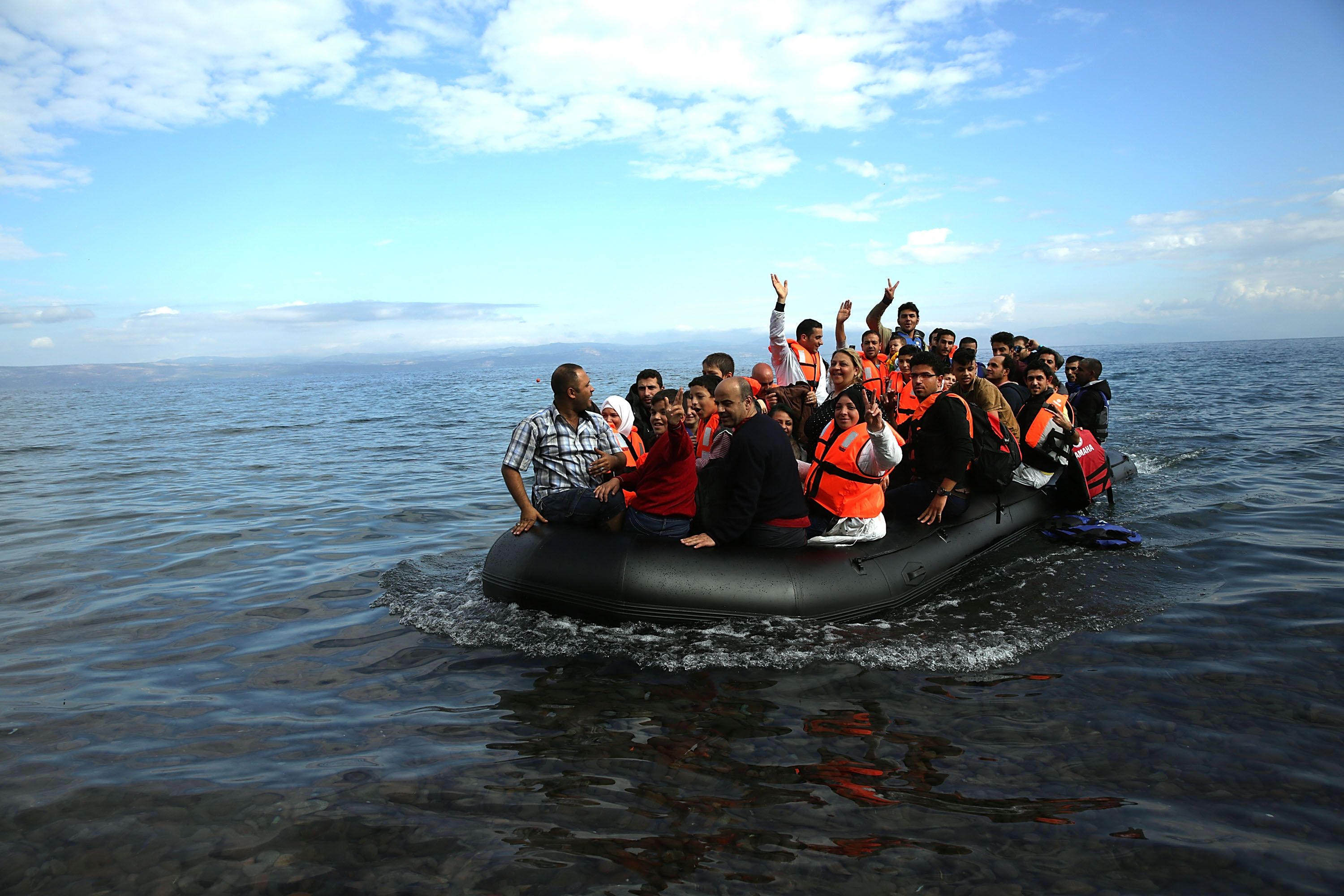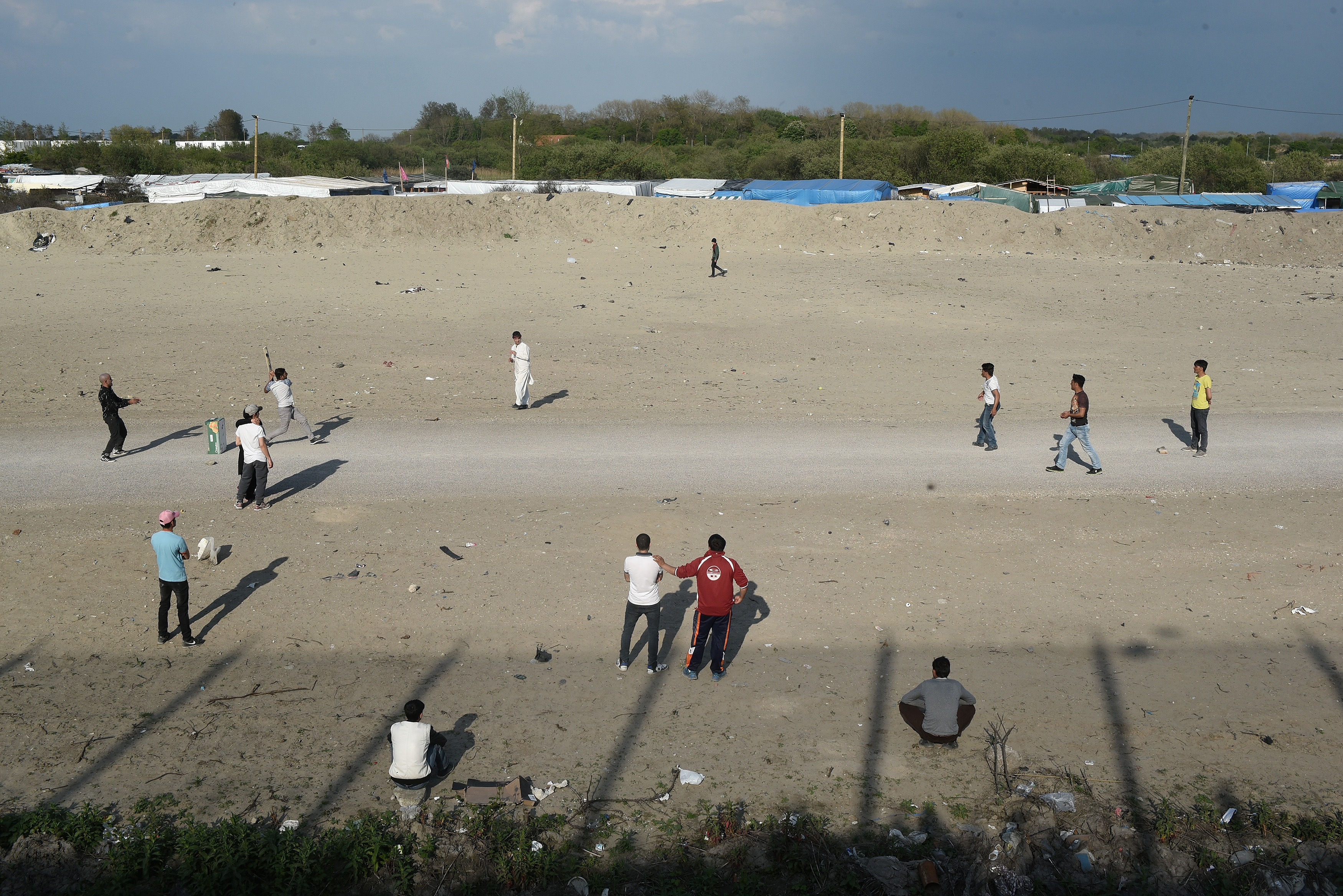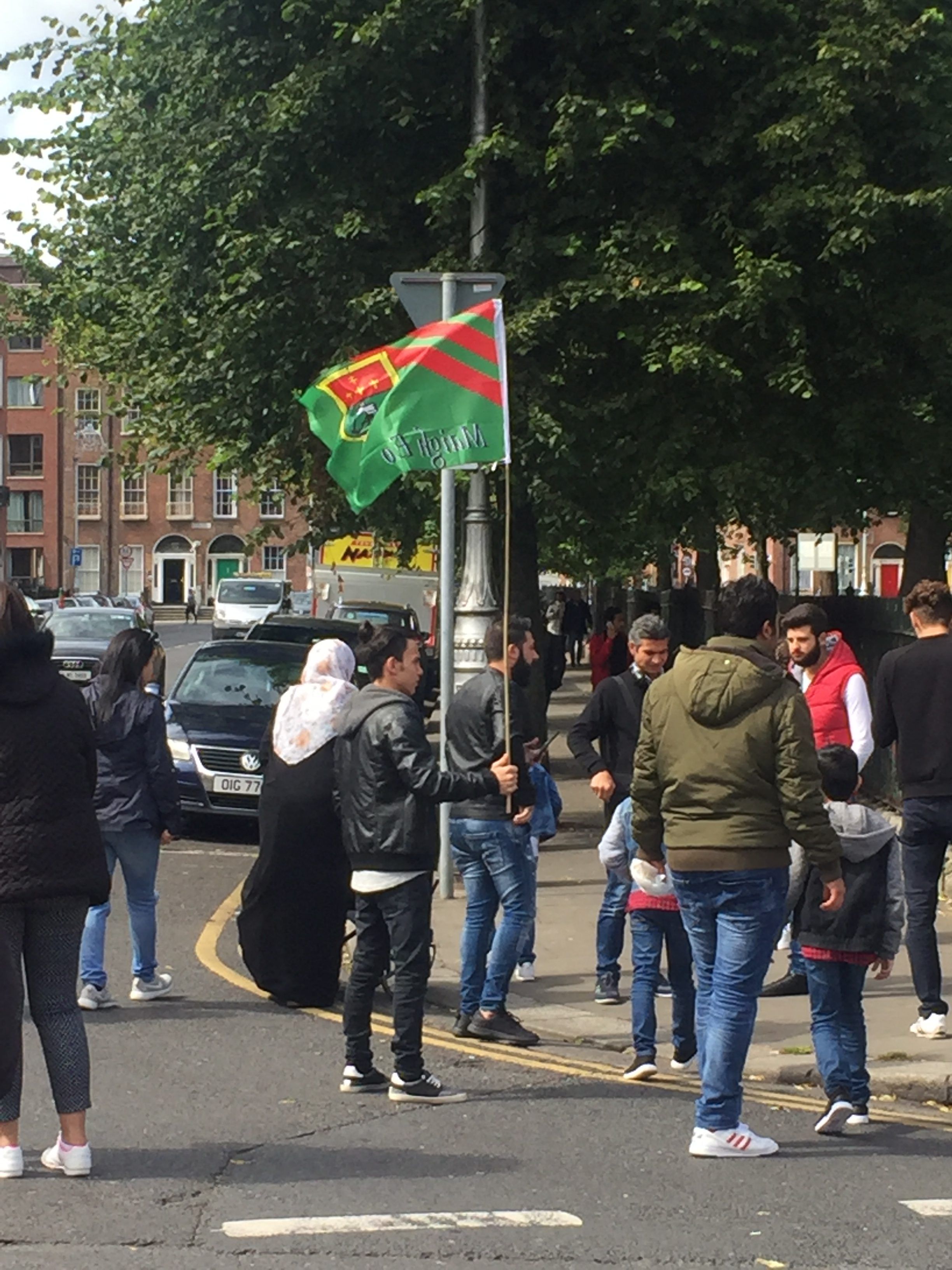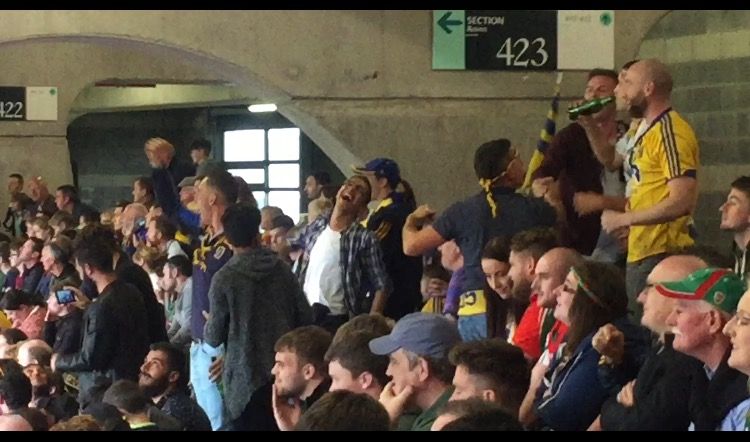

Share
5th August 2017
09:55am BST

The residents of the Abbeyfield Hotel are Syrians and Iraqis who moved to the town earlier this year as part of Ireland’s commitment to accept refugees displaced by the war and destruction in their countries. The hotel was built in the boom years, but didn’t survive the recession. It is now a designated Emergency Reception & Orientation Centre opened again to take refugees who fled the two countries and arrived in Ireland from Greece.

Later on Saturday evening, some of the residents were at reception of the hotel collecting the papers which informed them they had been granted refugee status. That status will allow them to work, to join the system and to live again.
They exist now and they’re happy about that, given the alternatives of existence and non-existence that became a part of their lives when war destroyed their countries.
The people of Ballaghaderreen have provided a tremendous welcome for the refugees but soon they will hope to move on, to attempt to expand their lives in towns and cities across the country.
Their futures may have been defined by the war, but their lives are not the war. Their lives were before the war, and their lives are a future that is uncertain. Their lives were what happened before they lost family members, before everything changed and they had to flee their cities and their country. Then they ended up on the other side of a continent, on the far side of an unknown country, in a town they had never heard of, in a town called Ballaghaderreen.
https://twitter.com/joedotie/status/893468886187769856In 1898, the British government were planning to redraw the local authority borders across Ireland. In Ballaghaderreen, Co Mayo, the local MP and businessman John Dillon felt the town - on the border between Roscommon and Mayo - should relocate itself to Roscommon, where, as it happened, business rates were cheaper. He tabled a motion in the House of Commons and as a result the Local Government (Ireland) Act 1898 moved Ballaghaderreen from Mayo to Roscommon. But Ballaghaderreen GAA club had other ideas. “We wouldn’t recognise any act of the British parliament,” one local joked on Sunday. The GAA club stayed in Mayo. Those who line out for the club in the town may consider themselves from Roscommon, but if they play inter-county football, they must line out for Mayo.
Elaine Mernagh’s life changed when she was struck, as so many were, by the plight of the refugees fleeing Syria. A friend of hers set up a GoFundMe page with the aim of raising several hundred euro for refugees scattering across Europe. Instead they ended up with close to a hundred thousand and Elaine accompanied her friend on a trip to the Jungle in Calais. She spent a few days there and when she came home, she immediately booked a flight back for the following week.
For a year, she was commuting between Ireland and Calais, and when Ireland accepted a couple of thousand Syrian and Iraqi refugees, she became a point of contact for those who were first to arrive, which is how she met Kamel Sandaan.

Kamel was living in Balseskin Reception Centre in north county Dublin when he arrived in Ireland. He was in the second group that headed for Ballaghaderreen and Elaine knew they would need something to do.
Last Sunday morning, Kamel was wandering around the Abbeyfield hotel with 50 tickets for the All-Ireland quarter-finals in his back pocket. Kamel is from Idlib in the northwest of Syria. Before the war, he was in university studying agriculture and he hopes to continue studying in Ireland when he is allowed.
While Elaine booked the coach and sourced the tickets through her friend Jimmy D'Arcy who works in Croke Park, Kamel found out who was interested in the hotel and took care of things there. He made sure everyone got on the bus and, most importantly, he made sure they all came back.
His English is good so Kamel does a lot of organising, but he is a natural too. He is 25, but looks younger.
Many of the residents take English classes every day, but Kamel’s English means he doesn’t go to the classes. Instead he waits for the next stage of his life to commence, and while he waits he thinks about his family. His father and brother are still in Syria - his mother was killed in the war - and his sister is in Sweden and has been waiting two years in a refugee centre for her papers.
When he was in Greece, Kamel was asked to write down eight countries he would like to live in. His English was good - although the time in Turkey and Greece had made it rusty - so Ireland was a country he was happy to put down on his list. And now he lives in Ballaghaderreen.
The people of Ballaghaderreen have been wonderful. The town went out of its way to make sure the refugees were taken care of, but there is only so much they can do. For the families and especially for the young men who live in the Abbeyfield Hotel, it is a challenge to pass the time.

Elaine Mernagh knew this, she knew they needed something to do. With Mayo playing Roscommon, she thought she had found a day out they’d remember.
It would be fun, she thought, to let them see the national games in Croke Park. She didn’t care too much about the Mayo-Roscommon rivalry, although it was a hook for refugees living in Ballaghaderreen. In fact, she worried about it a bit.
Elaine, like most who work with refugees, was sensitive to local reaction. She didn’t want people picking sides in case somebody in the community was put out. The reaction to their trip has told a different story.
Through the generosity of the GAA who provided tickets and a fundraising appeal to pay for the coach, she was able to plan a day out for the residents of the Abbeyfield Hotel.
They didn’t travel to Dublin determined to pick a side, to take part in some forced act of integration or to commit themselves for life to the GAA.
They may have returned to Ballaghaderreen with a side picked and a feeling that they understood the town and country they live in a little better. They were certainly ready to commit to the replay on Monday, but that was not the reason for the trip.
Before they left last Sunday, some of them were curious about Gaelic football, including some of the younger ones who have played locally with Ballaghaderreen. Some were happy simply to be spending a day in Dublin. But mainly they did it because they could. It was something to do.
There is not a lot they can do. They get their meals in the hotel and each Friday they receive €19 to keep them going for the week. So mainly they wait and, since they fled Syria, they have been doing a lot of waiting. They waited in Greece. And when they found out where they were going, they waited again. They were interviewed and vetted by the Irish authorities before they arrived and now they wait for the next stage of their lives.
A lot of the refugees find it hard to sleep. They spend a lot of time thinking of those they left behind or those who are elsewhere in Europe.
Some decided on Sunday morning that they didn’t want to get up at 7.30 and head to Dublin. But when those who did go returned on Sunday night, those who stayed heard the stories and wanted to go for the replay.
Kamel’s closest friend in the Abbeyfield is Ghassan Shamet. Ghassan comes from Deir ez-Zour in eastern Syria. He was in school when the war came to his city. He hopes to become a journalist in Ireland one day. I’d like to tell him the industry is dying, but then you meet a guy like Ghassan and think it wouldn’t be if it had more people like him.

Seham Hussein, known to everyone as ‘grandmother’, travelled to the game as well with her daughter and granddaughters. Ghassan is a part of their family now.
They were all on the bus to Dublin. One side of the coach was decorated in Roscommon’s colours and the other in Mayo’s, but there was little interest in taking sides as they made the journey.
Soccer is the sport they love and on Saturday night, they had talked about the Real Madrid-Barcelona game taking place in Miami rather than anything to do with the All-Ireland.
But that was the point. They had no desire to fake interest. They have been treated with kindness in Ballaghaderreen and they were curious about the game, but that was all.
Many went to Dublin wanting to shop. The Spire is the landmark they know in Dublin and everything is measured by how far it takes to walk to the Spire (on Saturday one man asked me how long it would take to walk from Dublin airport to the Spire as he was meeting his wife and children who he hadn’t seen in many months).
So when the bus parked in Mountjoy Square, some headed for the Spire while the kids played in the park.
They had all returned from shopping in time to head into Croke Park for the first game which dragged, But by the time Roscommon and Mayo came out, they had picked their sides. Ghassan had been a Mayo fan in Mountjoy Square, but now he supported Roscommon, mainly to wind up Kamel.
As the underdogs scored the early goals and rattled Mayo, Ghassan celebrated wildly with other hardcore Roscommon supporters and most of the group became engrossed. A Mayo supporter urged them on and told them how her father who lived in America would be thrilled to know that Mayo was attracting a new wave of supporters. Nobody told her about Ghassan.

And as the day went on, the real purpose of the trip became clear: it was about the future, about bringing hope back into the lives of the refugees, but also of allowing the towns of Ireland to see the life refugees can bring to their communities.
In this connection, in this shared experience of exile and loss, a country can be energised by all the refugees can bring. These refugees don't think they will ever be able to return to Syria again and they accommodate that loss in their new world: Ireland.On Sunday, it was possible to see once again that Ireland is so often a country where the people are far ahead of the politicians and the bureaucracy sometimes appears to exist solely to drain energy from its people.
The Syrian and Iraqis returned to the Abbeyfield Hotel late on Sunday. By Tuesday, Elaine and Kamel were planning the replay. Kamel wanted to make sure they would also have their planned shopping trip to Galway and Elaine assured him that this would be an extra trip, another day filled with something other than their own thoughts.
JOE have sponsored the coach which will take them to Dublin on Monday for the replay, while Jimmy D'Arcy did his thing and GAA confirmed on Wednesday that they would give them free tickets for the game
So at 8am on Monday, they will head east again. They might do some shopping, but they will also know a little more about the game they’re going to watch, among people they might understand a little better and who wouldn't find it hard to understand them.
“If I arrived in a strange country, the last thing I would want is for people just looking at me and wondering who I was,” Elaine Mernagh says. “I would want them to talk to me and become my friend. This is our holocaust. It’s come to our continent and we have to respond. We’ve all seen films about World War I and World War II and refugees then. You’re thinking, ‘If I was around then and they came to my door, I’d help’. Well, do it then - because this is it.”
Ireland is doing the right thing by accepting refugees and it could do a lot more of the right thing. And the country benefits, not just the refugees who have suffered.
“A future is not just having shelter and food. That’s not living, that’s surviving," Elaine says. "What’s the point of life if you’re just there to be alive? That’s not the purpose of life. They should be given the opportunity to do what they want to do. That’s living or else what’s it all about?”
Elaine Mernagh was talking about the refugees as they move on from simply existing and try to create new lives, which may be as normal as the lives they once had, if so much they loved hadn't been lost. The trip to Croke Park was not about rivalry or choosing Mayo over Roscommon, it was about making a small step from the world of the existence to one that is multi-layered. It was about making that journey and telling the refugees of Ballaghaderreen that, yes, now your lives are here with us.
Explore more on these topics:

Life Style | Joe.ie
life style